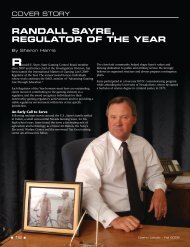View current issue (PDF) - International Masters of Gaming Law
View current issue (PDF) - International Masters of Gaming Law
View current issue (PDF) - International Masters of Gaming Law
Create successful ePaper yourself
Turn your PDF publications into a flip-book with our unique Google optimized e-Paper software.
<strong>of</strong> movement and gaining a similar adrenalinrush to watching a horse race or a footballmatch with money staked on the result.Binary options are traded on stocks,options and futures markets (for example, theChicago Board Options Exchange and Amex– The American Stock Exchange 4 ) and areseen in many places as financial instruments.However, they’ve been popularized in the lastcouple <strong>of</strong> years by some very aggressive, veryclever, mainly Israeli enterprises, largely usingCyprus-based companies. Aside <strong>of</strong> a handful<strong>of</strong> independents, the supplier marketplaceconsists <strong>of</strong> five major “platforms” – s<strong>of</strong>twareproviders who have turnkey solutions for<strong>of</strong>fering binary trading on the web. Thesehave the best part <strong>of</strong> 300 “white labels”– essentially risk-taking marketing B2Ccompanies who promote the s<strong>of</strong>tware <strong>of</strong> theplatforms on branded sites around the world,usually in return for a setup fee and a pr<strong>of</strong>itshare. The largest binary options platform,SpotOption, claims to support 65-70% <strong>of</strong> theworld market. All five major Israeli platformsare well funded, pr<strong>of</strong>essionally run, and havemassive transactional volumes. However,the majority <strong>of</strong> operators using them arepresently unregulated, meaning there is noprotection <strong>of</strong> investor funds and no marketoversight <strong>of</strong> their <strong>of</strong>ferings and practices.The options are traded “over-the-counter,”direct from seller to buyer, and the customerrequires little or no knowledge to participate.Naturally the operators attempt to <strong>of</strong>fer their“odds” on an algorithmic basis so that theyshow a net gain for each day’s trading.The financial problems <strong>of</strong> Cyprus havecaused both platforms and operators (“whitelabels”) to re-think their dependence onthe country, its banks, and importantly itslicensing authority (CySec 5 ). Increasinglythey are looking towards Malta, the Isle<strong>of</strong> Man, and possibly other places, fortheir global regulation and credibility,while engaging in discussion withregulators regarding national licensing.This is remarkably similar to the gamingenvironment <strong>of</strong> today, and begs the questionas to which body, where gambling andfinancial services are licensed by differentauthorities, should <strong>issue</strong> the licence and bethe regulator.Why is the distinction important?Competition in the binary options3London Affiliates Conference, 7-10 February 2013, http://www.igbaffiliate.com/events/marketplace has made regulation, withthe attendant marketing opportunity, anattractive haven for many operators. Thejurisdictions <strong>of</strong> choice for licensing haveclearly debated, and in some cases struggledwith, the distinction, with varying results asexplained below.However, there are two much moresubtle and compelling reasons why binaryoptions operators really, deeply want to beconsidered purveyors <strong>of</strong> financial products.The first relates to payment card processing.If a binary option is a gamble, then the allimportantMCC – Merchant Category Code– assigned by the card schemes 6 is 7995. Thisis a restrictive code blocked by many issuingbanks, particularly in countries like Norwayand the USA, where internet gambling islargely or wholly illegal. If however thedeposit transaction when a trader funds hisaccount is a financial investment, then themerchant is able to apply for use <strong>of</strong> MCC6211, “Security Brokers/Dealers” or even6051, “Non-FI Money Orders.” The relativelikelihood <strong>of</strong> approval for a transactioneven for a country where gambling is legal,such as Spain, is significantly higher; incountries where gambling is prohibited andpayments methods are targeted as a means<strong>of</strong> control, the difference is between virtuallyguaranteed failure <strong>of</strong> a transaction, and astrong possibility <strong>of</strong> success.Secondly, religious, cultural andlegislative differences open or closemarkets for the operators. Binary Optionsare popular in the Arab states, wheregambling is illegal under secular andreligious laws. Binary companies are keen to<strong>of</strong>fer their services in the lucrative markets<strong>of</strong> Saudi Arabia, Qatar, the Emirates andothers, but can only do so if they are <strong>of</strong>feringfinancial services. Obviously construed asa gambling product, taking customers forbinary options would be difficult at best andlargely impossible when considering thepayment aspect.How have different jurisdictionsapproached the problem?The starting point for considerationin a European context is <strong>of</strong> courseMiFID. Section C <strong>of</strong> Appendix I setsout a list <strong>of</strong> “Financial Instruments”and, while it does not mention binaryoptions by name, includes:“(4) Options, futures, swaps, forwardrate agreements and any other derivativecontracts relating to securities, currencies,interest rates or yields, or other derivativeinstruments, financial indices or financialmeasures which may be settled physically orin cash.”From the point <strong>of</strong> view <strong>of</strong> operatorswithin the EU, this looks like a slam dunk,clear end to the debate. Binary options fitthis definition squarely, and the force <strong>of</strong>MiFID then comes to bear; firms <strong>of</strong>feringbinary options to the public are required tobe authorized and regulated in their homestate (the state where their registered <strong>of</strong>ficeis located). This is a departure from theprevious situation under the ISD whereregulation was required where the activitytook place. From the point <strong>of</strong> view <strong>of</strong> anoperator with branches in several countriesit is a welcome improvement, for it opensup the possibility <strong>of</strong> passporting theauthorization throughout the EU and EEA.Within the EU, implementation <strong>of</strong> MiFIDin respect <strong>of</strong> binaries is at different stages.Elsewhere however, different approacheshave been taken. Here follows a review<strong>of</strong> the situation in some <strong>of</strong> the principaljurisdictions where serious considerationhas been given to the <strong>issue</strong>.CyprusCyprus has the distinction <strong>of</strong> having beena first mover in this area, and arguably <strong>of</strong>having the clearest legislation on the <strong>issue</strong>.Binary options, beyond doubt, are financialinstruments in Cyprus, and regulatedaccordingly. All Cypriot firms <strong>of</strong>feringbinary options are required to bring theiractivities within the ambit <strong>of</strong> the regulatoralongside other investment companyrequirements. What has however muddiedthe waters considerable is the establishment<strong>of</strong> a series <strong>of</strong> delaying and grandfatheringprovisions, which have essentially allowedCyprus firms to continue <strong>of</strong>fering binaryoptions while their applications for licence<strong>issue</strong> or modification are pending. At thetime <strong>of</strong> writing most Cyprus operators whohave applied for licences are “in limbo”pending determination <strong>of</strong> their applications,but are freely permitted to continue to <strong>of</strong>ferproducts despite the not-yet-determinedstatus <strong>of</strong> their licence applications. A Cypruslicence remains a valuable prize, despitethe economic difficulties <strong>of</strong> the country,londonaffiliateconference/schedule4Where they are referred to as “Fixed Return Options.”5Cyprus Securities and Exchange Commission.6Visa and Mastercard, principally. American Express does not permit gambling transactions to be paid forusing its cards..European <strong>Gaming</strong> <strong>Law</strong>yer | Autumn Issue | 2013 | 27



